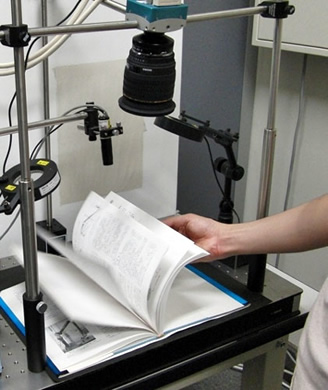It appears Google has asked for a summary judgment regarding the legality of scanning books and posting them online via Google Books. Google defended its book-scanning project (formerly known as Google Library) on the basis of fair use, preserving those works, the advancement of public knowledge and even the benefits to rights holders. Google Books, according to the company, represents the biggest advancement in book cataloguing within the past 50 years.
The service, which debuted in 2004, can search the full text of any book found within Google's virtual "library". In order to create this enormous, searchable index of books, the search giant has been transcribing physical volumes to digital formats for many years – a truly monumental undertaking, regardless of its legality. Many of its original books came from public libraries.
Google believes firmly its use of literary works is covered under fair use -- a claim that delicately hinges on four primary considerations which essentially ask the following questions:
- What is it?
- How are you using it?
- How much of it is being used?
- What impact does this use have on its creators?
Interestingly, Google minimized the negative effects of its service on rights holders in its statement.
Plaintiffs have adduced no evidence that Google Books has displaced the sale of even a single book. A survey of authors has shown that the majority of authors approve of their inclusion in Google Books, and that the vast majority do not perceive any harm from such inclusion. Plaintiffs have adduced no evidence that returning search results, either with or without snippets of text, has any direct adverse economic effect on authors
Source: court filing, paidcontent.org
In fact, Google seems to believe that Google Books actually helps authors, publishers and others through improved discovery and promotion. Google points out that when users view the contents of a book in their digital library, they'll also see links to buy the full version.
William Morris [the world's largest literary agency] believes that inclusion in Google Books "is a fair use and not detrimental to the copyright owner in any way." William Morris holds this view because it "appears to be in an author's best interest to have their work come up in a search through the database, just as website rankings are desirable in connection with Google searches. Additionally, Google Book Search currently lists, on the right of the screen, which distributors have the book for sale, along with a link for purchase."
Source: court filing
Google Books has repeatedly met opposition by authors and publishers who have criticized the company for its hubris, being accused of taking copyright laws into its own hands. Google's "opt-out" policy means that – without consent – authors and publishers have the entire content of their works uploaded by Google. The onus of having those works removed then falls upon rights holders who must contact Google, a fact which has upset The Authors Guild and its constituents.
It is expected that The Authors Guild will move ahead with its own summary judgment, in response to Google's. The Authors Guild original sued Google in 2005 over its book scanning efforts. The greener pastures of potential settlement delayed the lawsuit for a period of time, but that deal was quashed by the currently presiding judge.
